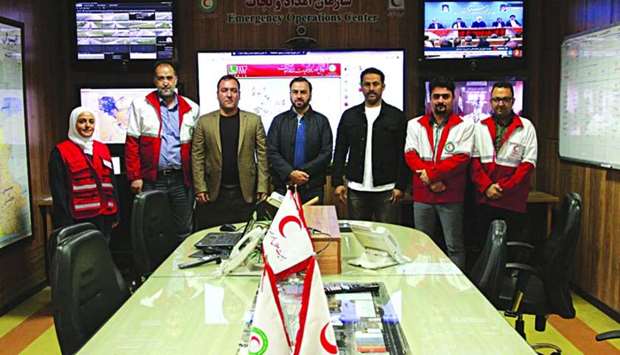In an immediate response to the heavy rainfall and subsequent flash floods in many parts of Iran, Qatar Red Crescent Society (QRCS) has started an emergency intervention operation to help the victims.
A relief delegation was sent from Doha to assess the needs, supervise the early response process, and coordinate with the Iranian Red Crescent Society (IRCS) and the International Federation of the Red Cross and Red Crescent Societies (IFRC).
Just after the disaster, the Disaster Information Management Center (DIMC) was activated to keep updated about the situation and coordinate with international partners.
Within a few days, a relief delegation was deployed to the affected regions, where the disaster lasted for over a month, with dozens killed and almost half a million displaced.
The disaster management specialist delegation comprised Jassim Al-Emadi, Fatimah Al-Mohannadi, Saleh Al-Ghanem, and Aiham Al-Sukhni. Upon their arrival at Iran, they started the assessment and response arrangements.
They met Morteza Salimi, head of the Relief and Rescue Organization of IRCS, to discuss the damage and how to help the victims. Then, they took a tour at IRCSs relief item manufacturing plant.
In Ahvaz, the capital city of Khuzestan Province, south-western Iran, the delegation held meetings with relief teams, visited the provinces only mental health hospital, and went also to IRCSs prosthesis manufacturing plant.
Dr. Ali Khodadadi, Managing Director of the Khuzestan provincial Red Crescent branch, reviewed with the team the needs in the coming short period and how to meet them. Dr. Nazari, Head of General Health Directorate in Khuzestan, talked about the short- and long-term medical requirements, highlighting the risks of water-borne diseases, particularly in the summer.
QRCS's delegation surveyed several villages, interviewed the local communities, and documented the damaged houses and utilities. They were accompanied by Mahmoud Reza Peyravi, Secretary-General of IRCS, who thanked QRCS for their efforts.
According to the six-month relief plan, QR 1.8 worth of nonfood items will be distributed to 3,000 worst affected families (15,000 persons), including tents, blankets, kitchenware, and household items.
Cash aid will be handed over to the most vulnerable farmers in 31 provinces to buy their household needs. To that effect, a memorandum of understanding (MoU) will be signed among QRCS, IRCS, and IFRC. Special attention is paid to the issues of protection.
Just after the disaster, the Disaster Information Management Center (DIMC) was activated to keep updated about the situation and coordinate with international partners.
Within a few days, a relief delegation was deployed to the affected regions, where the disaster lasted for over a month, with dozens killed and almost half a million displaced.
The disaster management specialist delegation comprised Jassim Al-Emadi, Fatimah Al-Mohannadi, Saleh Al-Ghanem, and Aiham Al-Sukhni. Upon their arrival at Iran, they started the assessment and response arrangements.
They met Morteza Salimi, head of the Relief and Rescue Organization of IRCS, to discuss the damage and how to help the victims. Then, they took a tour at IRCSs relief item manufacturing plant.
In Ahvaz, the capital city of Khuzestan Province, south-western Iran, the delegation held meetings with relief teams, visited the provinces only mental health hospital, and went also to IRCSs prosthesis manufacturing plant.
Dr. Ali Khodadadi, Managing Director of the Khuzestan provincial Red Crescent branch, reviewed with the team the needs in the coming short period and how to meet them. Dr. Nazari, Head of General Health Directorate in Khuzestan, talked about the short- and long-term medical requirements, highlighting the risks of water-borne diseases, particularly in the summer.
QRCS's delegation surveyed several villages, interviewed the local communities, and documented the damaged houses and utilities. They were accompanied by Mahmoud Reza Peyravi, Secretary-General of IRCS, who thanked QRCS for their efforts.
According to the six-month relief plan, QR 1.8 worth of nonfood items will be distributed to 3,000 worst affected families (15,000 persons), including tents, blankets, kitchenware, and household items.
Cash aid will be handed over to the most vulnerable farmers in 31 provinces to buy their household needs. To that effect, a memorandum of understanding (MoU) will be signed among QRCS, IRCS, and IFRC. Special attention is paid to the issues of protection.

